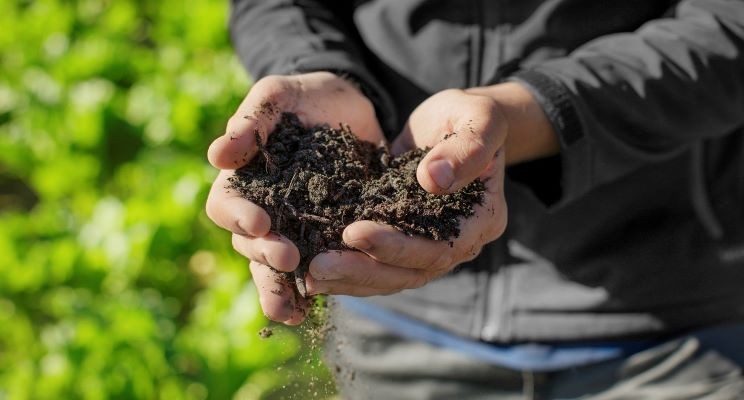Decarbonizing Agriculture: Learnings From Working in International Coalitions
Published 01-19-22
Submitted by Bayer

Originally published on LinkedIn
It feels like yesterday that Sir David Attenborough opened the global UN Climate Change Conference with one of the most powerful speeches I’ve ever heard on climate change. In his speech he made one thing very clear: “We must halve carbon emissions this decade. We must recapture billions of tons of carbon from the air.” To achieve this – we need a new industrial revolution. One that clearly focuses on sustainable innovations and delivers a halving of emissions along with significant carbon capture in just 10 years. For many of us, this is clearly understood in theory – no doubts. But, how can we make this happen fast and effectively?
Let’s focus on the agriculture industry – a sector that accounts for roughly one third of global carbon emissions. John Crawford from the University of Glasgow and myself are both leading international coalitions dealing with the decarbonization of agriculture: The Global Soil Health Programme and the EU Carbon + Farming Coalition – both set to deliver operational solutions at scale and on time.
The Global Soil Health Programme consists of major global corporates and soil scientists working towards a global framework for the improvement of soil health. This includes the sequestration of carbon in soils through a programme-managed carbon sequestration campaign. Special focus is on measurement, reporting and verification of soil organic carbon.
But why is this topic of special interest? Soil health is central to addressing both the climate and biodiversity crises. Carbon is the energy source, used by soil organisms, that maintains both the physical and biological properties of soil in an efficient and productive state. Carbon changes the state of soil such that it improves water and nutrient storage, enables these stores to move more easily towards plant roots, and reduces emissions of greenhouse gases. The UN has calculated that restoration of soil health has the potential to draw down two giga tons of CO2eq per year1. This corresponds to the minimum level of offsetting required to keep global warming below 1.5°C under the most optimistic emissions reduction scenarios. Investing in global soil health therefore presents opportunities to increase yields and resilience, decrease further biodiversity losses by reducing the need to open new land for cultivation, reduce food and water insecurity in supply chains and achieve climate targets in hard-to-abate sectors.
At the same time and fully independent from one another, The EU Carbon + Farming Coalition, powered by the World Economic Forum, is a group of corporates and institutions representing every step of the food value chain that jointly deals with the decarbonization of the EU Food systems. The coalition is particularly looking to support the implementation of the Green Deal by co-designing decarbonizing solutions with and for farmers.
Both coalitions follow different approaches but are complementary. Fixing soil is only one part of the story, since 2/3 of emissions for the agri-food sector are created beyond the farm gate. Changes in consumption patterns, processing, packaging, and transport can have an even greater impact on climate and biodiversity than solutions that only focus on food production. Therefore, in a joint effort, the coalitions can help deliver a whole food system solution.
Since this needs a whole system transformation, co-designing with all the stakeholders is the only approach, and the coalitions are doing a great job in bringing different stakeholders at the table to do exactly that.
John and I are honored to have leading roles in both coalitions. During our work with different partners, farmers and stakeholders we have learned a lot and have gained valuable experiences which are worth sharing as the industry is working towards reducing carbon emissions.
1. We need to look at the entire cropping system holistically
We don’t fix a system by fixing the parts in isolation, and there is no one-size-fits-all solution. One must know that the cropping systems in Europe and globally are very diverse which makes it hard to really find scalable solutions. Looking after a crop or a commodity won’t be enough. When designing solutions, we need to think in terms of a fully integrated cropping system. It means that the crop rotation, other production systems on the farms, and the overall landscape management must be part of it. Therefore, different aspects and influences such as geographies, farmers’ capabilities local practices, economics, availability of data and technologies must always be considered.
2. A new relationship between science and farming
Richard Feynmann who was awarded the Nobel Prize of Physics in 1965 once said “Science is a way of trying not to fool yourself. The principle is that you must not fool yourself, and you are the easiest person to fool.” We need science to be the guide in delivering impact, and both coalitions have science at the core. However, science is a process, not an outcome. Nature keeps presenting us with new twists that we didn’t expect. Although science underpinning agriculture continues to have knowledge gaps, the urgency is too big to wait. We need to build solutions based on our current knowledge and make these solutions better as the science improves. This needs a different approach, and here we can again learn from Nature.
In coalitions, innovation can be a shared activity that combines scientific and business knowledge with the governance and reach of business to create new solutions more quickly. Farmers play a central role because they are all innovators, and they can tell us when things don’t work the way science thinks they should. Contributing their knowledge and pointing to gaps in our science that need to be filled, farmers become the citizen scientists in this innovation ecosystem. Data is the common currency that connects everything and everyone. Digitization across the food systems, where farmers have control over access to their data and can get material benefit from sharing, will enable us to accelerate the science and solutions.
3. To accelerate innovation, we need the right policies
As in all big questions – and as debated on at COP26 – the right policies need to be set that ease the way for innovations and have the power to accelerate change. In addition, we need a common set of science-based standards for MRV (Monitoring, Reporting and Verification), e.g. of how we measure carbon in the soil, to operate on the same basis. A standardized approach is needed in the market. Involving farmers is the key element of success.
Farmers clearly need to be in the center of the decarbonization solutions development. To put it simply: They are our customers and if we want to directly serve the customers’ need, we must consider their views and ideally co-create products. Therefore, solutions must be designed for and by farmers.
Especially because they are the ones facing technical hurdles and having financial and agronomic risks related to the adoption of new technologies and practices. We must consider local conditions, accessible practices, and available technologies when developing and evolving decarbonization solutions. In every step of the process, farmers should have decision-making authority. Therefore, we should embrace and empower a transparent discussion with all parties involved to question impacts, potential problems and practicability.
4. Know how to effectively set up a platform of collaboration
The best way to find optimal solutions quickly is to co-create. Even though both coalitions work differently, we have equally experienced the dynamics of cooperative work, which are relevant for any coalition across industries. To exploit the full potential of coalitions, one should keep an eye on certain drivers. A pre-condition of being successful with partners from the same sector is to find the pre-competitive space which allows collaboration beyond markets and regulations. Also, it will pay off to invest heavily in aligning ambitions and take huge efforts right at the start when setting up a coalition. Why? It might seem obvious but aligning between different perspectives is key in successfully joining forces. Setting up a framework of collaboration and sharing insights is valuable to benefit from each other and to maximize efficiency. Not just within one coalition but also between different coalitions that share the same goals. If John and I had never exchanged views about our work, we would never have been able to present our shared learnings now.
Against this background, we are convinced that cooperation is the only way to deliver the systemic shifts required to meet the biggest challenges our species has ever faced. From our point of view, a successful coalition is a group of private and public representatives which have the same goals and acknowledge that they cannot achieve them without the others. The impact of coalitions strongly depends on the diversity of perspectives which are enriching the debates (also making things more complex) but are reflecting a reality that we tend to ignore by our convenience to work with our peers in the same industry.
Since more and more coalitions are being built across sectors and topics, it will be key to maximize value through coalitions of coalitions, to share learnings, broaden the impact, and accelerate change. Time is very limited, and the scale of the challenge is unprecedented.
With the presented learnings in mind, we give our best to contribute to decarbonization in agriculture and develop tangible solutions that help limiting the amount of carbon in our atmosphere and restore biodiversity on our land. We look forward to convincing even more organizations and stakeholders to join in coalitions and benefit from diverse working groups towards building a more sustainable planet.

Bayer
Bayer
Bayer: Science For A Better Life
Bayer is a global enterprise with core competencies in the Life Science fields of health care and agriculture. Its products and services are designed to benefit people and improve their quality of life. At the same time, the Group aims to create value through innovation, growth and high earning power. Bayer is committed to the principles of sustainable development and to its social and ethical responsibilities as a corporate citizen. In fiscal 2015, the Group employed around 117,000 people and had sales of EUR 46.3 billion. Capital expenditures amounted to EUR 2.6 billion, R&D expenses to EUR 4.3billion. These figures include those for the high-tech polymers business, which was floated on the stock market as an independent company named Covestro on October 6, 2015. For more information, go to www.bayer.com.
More from Bayer

